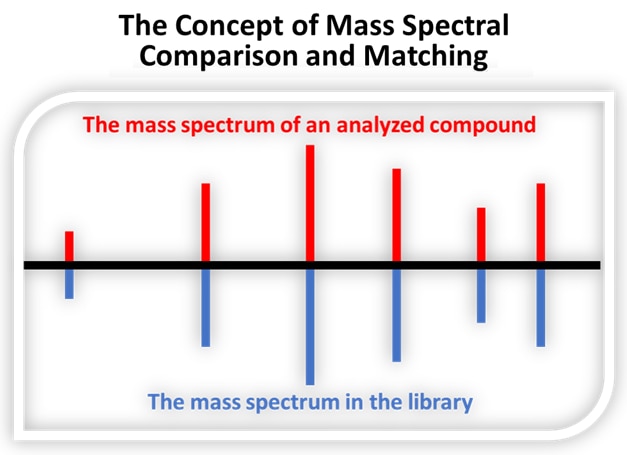At a glance
High resolution mass spectrometry is an emerging practice in laboratory analysis that determines a compound's identification to a higher degree of accuracy and precision using the compound's fragmentation spectrum. The collection of those spectra for an array of compounds can be organized into a shareable high-resolution mass spectral library.

Overview
High-Resolution Mass Spectral Libraries for Drug and Toxin Analysis.
Mass spectrometry is used by laboratories to confirm the presence of chemical compounds in clinical, toxicological, and environmental samples. Laboratories also use mass spectrometry to analyze the structure of a compound by breaking down the compound into its components and measuring their mass and intensity. This is called a fragmentation mass spectrum and the data is shared in a mass spectral library. The library can provide reference data to increase confidence in compound identification when commercial standard reference material is unavailable.
The high-resolution mass spectral libraries for opioid analysis available below include data that enable identification of all the 200+ opioids and opioid-related compounds covered by the TOM Kits® product line, along with additional toxins and drugs.
Multiple library formats are provided for use on Agilent, Sciex, or Thermo mass spectrometry platforms. The NIST library format, created from data collected on an Agilent QTOF for the FAS Kit and on a Thermo Exploris 480 for the EDP Kit, is also available for use on these and other instrument platforms.
For a full list of all compounds in each library, see here: Library Compound List-October 2024

Available libraries and specifications
FAS Kit Library
Total Number of Compounds: 251
Available Formats: Agilent, Sciex, Thermo, NIST
Instrument Type: Agilent 6545 QTOF Mass Spectrometer; Sciex TripleTof 6600+; Thermo Scientific QExactive HF
Ionization Type: Electrospray Ionization
Ionization Mode: Positive Mode Only
Precursor Type: [M+H]+
Curation: Noise Removal and Mass Correction of Fragments
Download this library: FASKitLibrary.zip
EDP Kit Library
Total Number of Compounds: 60
Available Formats: Agilent, Sciex, Thermo, NIST
Instrument Type: Agilent 6545 QTOF Mass Spectrometer; Sciex TripleTof 6600+; Thermo Scientific Exploris 480
Ionization Type: Electrospray Ionization
Ionization Mode: Positive Mode Only
Precursor Type: [M+H]+
Curation: Noise Removal and Mass Correction of Fragments
Download this library: EDP Kit Library
EDP Kit Library V1
Total Number of Compounds: 19
Available Formats: Agilent, Sciex, Thermo, NIST
Ionization Type: Electrospray Ionization
Ionization Mode: Positive Mode Only
Precursor Type: [M+H]+
Curation: Noise Removal and Mass Correction of Fragments
Download this library: EDP Kit Library V1
Toxins and Drugs Library V1
Data Collection Information: Library Overview
Total Number of Compounds: 89-119 (Instrument specific)
Available Formats: Agilent, Sciex, Thermo, NIST
Instrument Type: Agilent 6545 QTOF Mass Spectrometer; Sciex TripleTof 6600+; Thermo Scientific Exploris 480
Ionization Type: Electrospray Ionization
Ionization Mode: Positive Mode Only
Precursor Type: [M+H]+
Curation: Noise Removal and Mass Correction of Fragments
Download this library: Toxin-Drugs Library V1
Disclaimers
Results obtained from the use of these libraries may vary based upon instrument type, instrument settings, and specific method procedures. The library spectra by themselves are not intended for screening, monitoring, or diagnostic purposes.
All libraries and the information contained therein provided and covered under this agreement are being provided on an 'as is' basis. Except as expressly set forth herein, the CDC makes no representations, of any kind, either express or implied, with respect to the libraries and expressly disclaims any and all representations of any kind with respect thereto, including any representations of quality or fitness for a particular purpose. Unless otherwise stated, all libraries and related materials are considered to satisfy the quality standards relative to the purpose for which the libraries were collected. However, neither the author nor any part of the federal government can assure the accuracy, reliability, or suitability of the libraries or the information contained therein for a particular purpose. The act of distribution shall not constitute any such warranty, and no responsibility is assumed for a user's application of the libraries or related materials.
The findings and conclusions in this report are those of the authors and do not represent the official position of the Centers for Disease Control and Prevention. Use of trade names is for identification only and does not imply endorsement by the Centers for Disease Control and Prevention, or the US Department of Health and Human Services.
